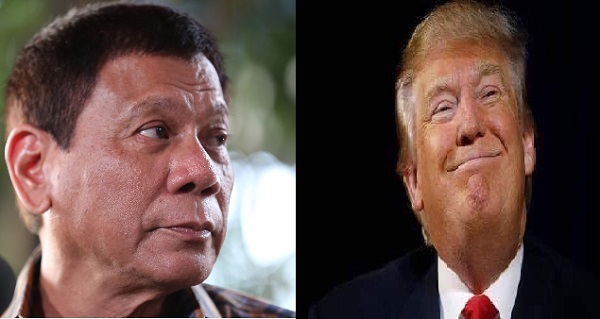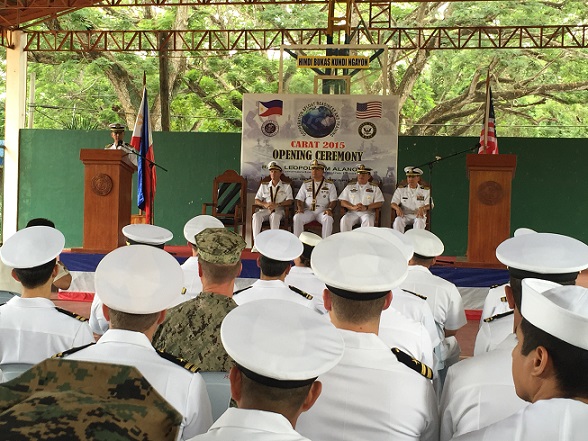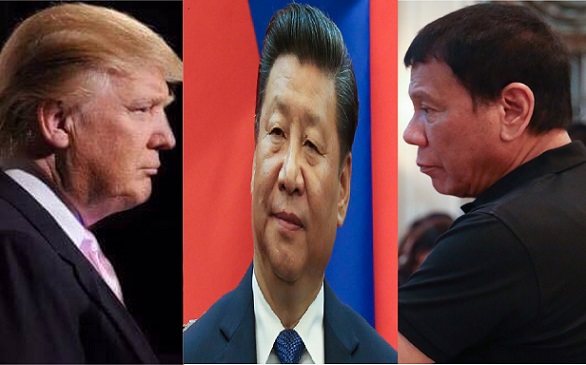
By CHARMAINE DEOGRACIAS
VERA Files
IF newly elected US President Donald Trump makes good his campaign threat to pull the United States out of the North Atlantic Treaty Organization (NATO), he might also pull the plug on the its Mutual Defense Treaty (MDT) with the Philippines.
Trump has called the international security alliance “obsolete,” saying it “is costing US a fortune.” He said as much about America’s other alliances in Asia.
These observations were contained in a pre-election research by the East West Center in Washington, D.C. that examined Trump’s pronouncements before the Nov. 8 election, focusing on key Asian issues as part of the “Asia Matters for America and America Matters for Asia” project.
Trump seemed to mirror the sentiment of President Rodrigo Duterte, who has also questioned the importance of the 65-year-old defense treaty with the US and said he willing to “revise or abrogate” it.
PH-US military alliance
Trump and Duterte share much more than their views on the MDT. For starters, Trump’s “America First” is to Duterte’s “Independent Foreign Policy.”
Saying the joint military exercises with the US have benefited only the Americans, Duterte recently called for an end to the drills in two years.
The East West Center, meanwhile, noted that Trump’s position on America’s alliances and security partners in Asia is that “the United States is being taken advantage of by allies who do not share the burden of defense costs as much as they should.”
“Furthermore, allies in the region should move towards maintaining more of their own security, be it in the form of an eventual US troop withdrawal from the region and/or the development of their own nuclear weapons,” the center said of Trump’s view.
In the first presidential debate on Sept. 27, Trump said, “I want to help all of our allies, but we are losing billions and billions of dollars. We cannot be the policemen of the world. We cannot protect countries all over the world.”
In the final presidential debate on Oct. 19, he named some of the countries: “As far as Japan and other countries, we are being ripped off by everybody in the—we’re defending other countries. We are spending a fortune doing it. They have the bargain of the century. All I said is, we have to renegotiate these agreements, because our country cannot afford to defend Saudi Arabia, Japan, Germany, South Korea, and many other places.”

The Philippines and Japan are America’s two treaty allies in Asia. The U.S. is treaty-bound to defend them from external aggression. The Philippines’ defense agreements are based on the 1951 MDT, which is also the foundation for the 1998 Visiting Forces Agreement (VFA) and the Enhanced Defense Cooperation Agreement (EDCA) signed in 2014.
Duterte, speaking to a group of Japanese and Philippine businessmen in Tokyo last month, said he was willing to “revise or abrogate” the agreements and reiterated that the US-Philippine military exercises would end.
But on the recommendation of the defense department, Duterte approved the continuation of the military drills and the implementation of EDCA during a Cabinet meeting last Monday. Defense and military officials enumerated the benefits of the country from the annual drills at the meeting.
Duterte, however, ordered the number of military exercises cut by half and scrapped naval drills, amphibious beach landings and boat raids of the Navy and the Marines. He also said the large-scale Balikatan exercises should focus on humanitarian assistance and disaster response and counter-terrorism.
The changes will be presented to US Pacific Command chief Adm. Harry Harris Jr. at a meeting in Manila on Nov. 22.
Trump xenophobia
The similarities between Trump and Duterte have been repeatedly pointed out—from their controversial campaign rhetoric, populist agenda and their praise for Russian President Vladimir Putin, to their treatment of women and relationship with media.
In congratulating Trump, Duterte said he and the new American president are alike, at least in cursing.
Trump, who has no government experience, is connected to the region by way of business. He owns a property in the Philippines—Trump Tower at Century City in Makati—and in South Korea and has ongoing projects in Asia, according to the East West Center research.
Earlier in his campaign in Portland, Maine he listed the Philippines among a dozen others he tagged as terrorist nations, whose citizens he said should not be allowed in America “because you can’t vet them.”
‘Pivot’ to China
Trump has vowed to “make America great again.” Duterte has vowed to make Mindanao great. Driven by this agenda, both are looking at China economically.
Only China can help the Philippines, Duterte said in an interview with Xinhua. In his four-day visit to Beijing last month, his “pivot” to China resulted in $24 billion in loans and investment projects from the Chinese. Duterte has effectively restored the country’s friendly ties with China.
In his “America First” speech on April 27, Trump said fixing US relations with China is an important step toward creating an even more prosperous period for Americans.
“I love China. The biggest bank in the world is from China. You know where their United States headquarters is located? In this building, in Trump Tower. I love China. People say, Oh, you don’t like China? No, I love them,”
Trump said in a speech when he announced his candidacy on June 16, 2015.
Duterte said his advances to China are for the sake of the Philippine economy and he would not hesitate to set aside the bitter contention over the territorial dispute in the South China Sea.

The East West Center research noted Trump’s position on the South China Sea after an international tribunal ruled on July 12 that China’s claim in most of the area had no legal basis. He raised concern on China’s military buildup in the South China Sea and said such buildups should not be tolerated.
Trump referred to the South China Sea only once throughout his campaign. In his foreign policy speech in April he said, “A strong and smart America is an America that will find a better friend in China, better than we have right now. Look at what China is doing in the South China Sea. They’re not supposed to be doing it.”
Like Duterte, Trump views China in terms of trade, more than security.
But unlike Duterte, whose goal is to increase Chinese trade and investments in the Philippines, Trump intends to raise tariffs on China’s exports to America to arrest the U.S. trade deficit with China, which hit a record $365.7 billion last year. He also wants the US to use economic pressure on China to check on North Korea.
Trump in early January told the New York Times that the only power that US has with China is massive trade. “I would tax China on products coming in. I would do a tariff, yes — and they do it to us. I would do a tax. And the tax, let me tell you what the tax should be … the tax should be 45 percent,” he said.
The East West Center tracked Trump’s economic speech in Detroit in August in which he said, “At the center of my plan is trade enforcement with China. This alone could return millions of jobs into our economy. China is responsible for nearly half of our entire trade deficit.”
In a speech in New Jersey in May, a confident Trump said of US-China relations: “China will behave and China will be our friend. We’ll do better under China with me and we’re also going to do better economically with me.”
Human rights
If Duterte is allergic to human rights, Trump is mute on this issue.
Talks of human rights have riled Duterte. He called US President Barack Obama a “son of a bitch” and told him to “go to hell” when the US expressed concern on his bloody anti-drug campaign.
The East West Center research did not come across any speech by Trump on human rights and democracy in Asia.
Trump’s silence on human rights apparently sits well with Duterte who now wants the Philippines and the US to remain “friends and ally.” Earlier, during state visit to China, he announced a “separation” from the US in terms of economic and military ties.
Duterte’s more recent vitriol—for the US not to treat the Philippines “like a dog with a leash”—caught Trump’s attention.
Two weeks before the polls, he said in an interview with Reuters that Duterte’s comments showed “a lack of respect for our country.”
Since Trump’s election to the presidency, Duterte hasn’t picked a fight with the US—at least for now.
“The respect should be there, and in all matters that would affect our two countries, especially the treaties that we signed with them and there are so many agreements. It will be honored, all of these things,” Duterte said Thursday in Kuala Lumpur while on a two-day visit.
(The writer was recently on a residency research study for the Asia Studies Fellowship Program of the East West Center in Washington DC. )
(VERA Files is put out by veteran journalists taking a deeper look at current issues. Vera is Latin for “true.”)
Yes there are similarities in their pronouncements, but Duterte has a better haircut. Trump should hire a new barber. Perhaps Duterte should recommend a local barber, to break the impasse caused by his hostile remarks against Obama.
The two campaigns were characterized by similar styles and techniques. capitalizing on fear-mongering which affects the lower rungs of both societies, while the rest gets struck by the chilling effect.
But the psychopath jumped the gun on his western counterpart: yesterday he declared his intention to join a new world order led by Russia and China.